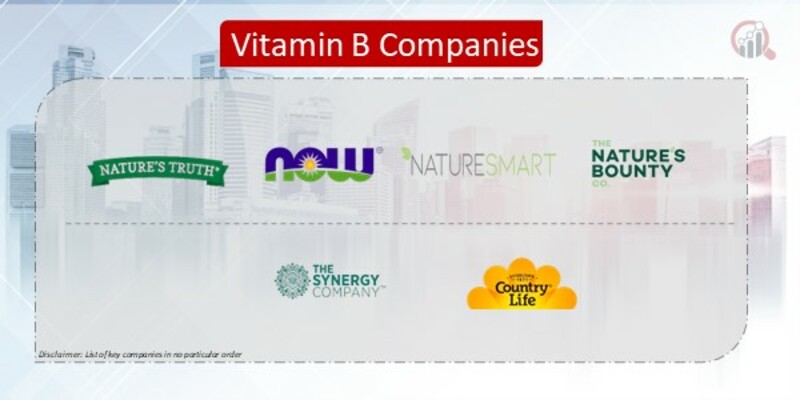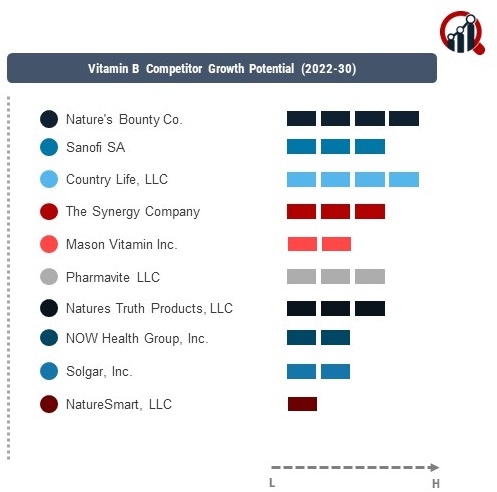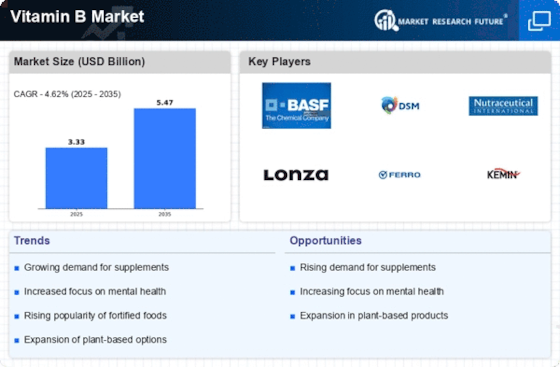Top Industry Leaders in the Vitamin B Market

Strategies Adopted by Vitamin B Key Players
Key Players
- Nature’s Bounty Co. (US)
- Sanofi SA (France)
- Country Life, LLC (Japan)
- Mason Vitamins, Inc. (US)
- Nature Smart, LLC (Canada)
- Solgar Inc. (US)
- NOW Health Group, Inc. (US)
- Natures Truth Products, LLC. (US)
- Pharmavite LLC (US)
- The Synergy Company (US)
To maintain and expand their market share, key players have adopted strategies such as mergers and acquisitions, partnerships, and product innovation. For instance, collaborations between pharmaceutical companies and biotech firms have become more frequent, aiming to leverage biotechnological advancements for more efficient Vitamin B synthesis. Additionally, there is an increasing focus on R&D for developing advanced formulations of Vitamin B complex supplements catering to specific health needs.
Factors for Market Share Analysis
Market share in the Vitamin B segment is influenced by several factors such as product innovation, distribution channels, regional presence, and brand reputation. Companies that offer a diverse product portfolio with high-quality, scientifically backed products tend to have a competitive edge. Furthermore, an extensive distribution network, including online and offline channels, also plays a crucial role in market penetration and customer outreach.
New and Emerging Companies
The Vitamin B market is witnessing the entry of new players, primarily from the biotechnology sector. These companies are focusing on producing Vitamin B through fermentation and other novel methods, which are more sustainable and cost-effective. Their emergence is expected to intensify competition and drive innovation in the market.
Industry News and Current Company Developments
Recently, there has been a surge in partnerships between pharmaceutical companies and nutritional supplement firms, aiming to expand product offerings and leverage each other's distribution networks. For example, A notable collaboration took place between a leading pharmaceutical company and a health supplement firm to develop a new line of advanced Vitamin B complex products.
Investment Trends
The Vitamin B market is attracting significant investments, particularly in areas of research and development, and the expansion of production facilities. Venture capital and private equity firms are increasingly interested in investing in companies that are at the forefront of innovation in the Vitamin B segment. This trend indicates a strong growth potential and investor confidence in the market.
Competitive Scenario
The overall competitive scenario in the Vitamin B market is marked by intense competition among existing players and a steady influx of new entrants. Established companies are continuously striving to maintain their market position through innovation and strategic alliances, while new players are attempting to carve out a niche by focusing on unique production methods or specialized products.
Recent Developments
The Vitamin B market witnessed several notable developments. One of the key trends was the increased focus on sustainable and environmentally friendly production methods. Companies have started investing in green technologies to produce Vitamin B, reducing the environmental impact and catering to the growing consumer demand for sustainable products.
Moreover, there has been a significant advancement in the field of personalized nutrition, where companies are offering tailor-made Vitamin B supplements based on individual health requirements and genetic profiles. This personalized approach has been well-received in the market, indicating a shift towards more customized health solutions.
In terms of geographic expansion, Asian markets, particularly China and India, have shown remarkable growth in the Vitamin B sector. The increasing awareness of health and wellness, coupled with the rising middle-class population in these regions, has led to a surge in demand for Vitamin B supplements. This has prompted many key players to expand their operations and distribution networks in these markets.
Furthermore, regulatory changes in various countries have also impacted the market dynamics. Stricter regulations regarding the labeling and marketing of dietary supplements have led companies to be more transparent about their product compositions and health benefits. This has increased consumer trust and is likely to positively influence market growth.











